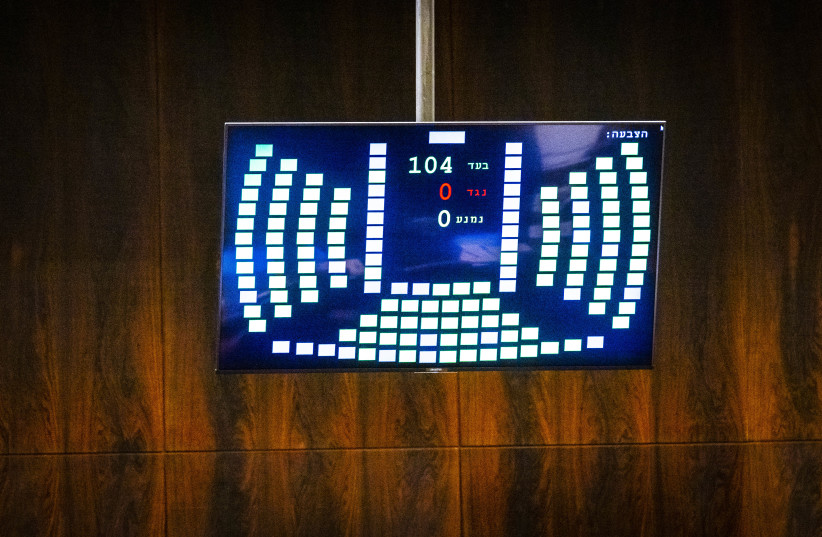MK Gilad Kariv (Labor) will convene the Knesset Law Committee on Sunday morning to prepare the bill to disperse the Knesset for its first reading, he announced on Thursday – thus undercutting MK Nir Orbach, who announced earlier in the day that he will convene the Knesset Committee on Monday at 9:30 a.m. to discuss the same bill.
If Kariv, who is part of the coalition, takes over the legislative procedure, he will control the pace of the bill’s passage. This would give the coalition leverage in its negotiations with the opposition over which bills the Knesset will push across the finish line before it disperses.
Knesset protocol states that the Knesset Committee is responsible for determining which body will debate each law. But Kariv went ahead and made the decision based on a section of the protocol that allows his committee to initiate a debate on specific issues, including an election, without prior approval.
“The Israeli public cannot be held captive by political moves,” Kariv said. “Once the Knesset voted nearly unanimously to move up the election, the process should be completed quickly and efficiently. If the Knesset Committee does not advance the process at a sufficient speed, we will do so in the Law Committee.”
The Knesset legal adviser’s office clarified soon after Kariv’s announcement that it had not approved the move, and viewed it as problematic if the Knesset Committee does delay the bill.

Opposition MKs deemed Kariv’s move illegal, and responded by halting the negotiations and reneging on prior agreements, N12 reported. The opposition also accused Kariv of hypocritically ignoring the committee’s legal adviser while portraying himself as a defender of the legal system.
Later on Thursday, Kariv stated that he had asked for the advice of the Knesset’s attorney-general and was told that there was no legal impediment to convening the committee. Orbach was given advance notice, Kariv added.
The Knesset Committee’s spokesperson said that the committee, with near certainty, will not vote on the bill, and the legislative process will remain within the Knesset Committee.
“The last people who can teach me about democracy and respect for legal advisers are MKs Yariv Levin, Yoav Kisch, [David] Amsalem and their friends,” Kariv said. “The Likud’s delay maneuvers prove only one thing: that they also know fully well that he who failed [to form a government] in the first four [election] rounds will fail in the fifth as well.”
Knesset may disband as soon as Monday
Depending on the ongoing negotiations between the coalition and opposition, the Knesset may disperse as early as Monday night. In case of a delay, it is still expected to pass by the end of Wednesday’s plenum.
The Law Committee will also debate on Sunday morning the Defendant’s Bill, which could block opposition leader Benjamin Netanyahu from forming the next government.
“This subject has been on the public agenda from the first day of the current Knesset, and there is room to hold a serious and in-depth debate on the issue in the Law Committee, which is responsible for the election laws and [laws pertaining to] forming a government,” Kariv said.
“North Korea – the Israeli version,” Likud MK and opposition whip Yariv Levin wrote on Twitter in response to Kariv’s announcement. “Dictatorships are the only places where [the country] announces an election again a moment beforehand expel the head of the opposition. MK Kariv and the current pathetic version of Labor are a black stain on the glorious history of the Knesset Law Committee.”
Alternate government a non-starter, Likud MK says
In any case, the attempt by the opposition to form an alternate government without the Knesset dispersing will almost certainly fail, Likud MK David Bitan admitted on Army Radio on Thursday.
He said that he even thought that an election was better for the Likud than an alternate government. The opposition parties, led by Likud, have a good chance of passing the 61-seat threshold without needing any current coalition members, he added.
Bitan’s assessment echoed that of Yair Netanyahu, son of opposition leader and Likud head Benjamin Netanyahu. A photo of the senior Netanyahu’s cellphone from the Knesset plenum on Wednesday showed a message sent from his son. Yair argued that Interior Minister Ayelet Shaked’s negotiations to form an alternate government may just be part of a ploy to buy more time so that the coalition can pass the Defendant Law, which would bar his father from forming a government in the next Knesset.
The Ministerial Committee on Legislation, headed by Justice Minister Gideon Sa’ar, will hold its weekly meeting on Sunday morning as well. The committee published its agenda on Thursday, and of 30 bill proposals, three are of particular importance: the “Defendant’s Law,” the law to limit a prime minister to eight years of continuous rule, and a bill sponsored by United Torah Judaism that will lower the electoral threshold from 3.5% to 2% of Israel’s voters.
UTJ proposed to lower the threshold because its Lithuanian faction, led by MK Moshe Gafni, is considering running independently of the hassidic Agudat Yisrael and may not pass the current threshold, Ma’ariv reported. The legislation is based on a similar proposal offered in 2019 by Meretz MK Mossi Raz, who supported the bill on Thursday. In recent polls, Meretz did not pass the electoral threshold as well.
The Knesset plenum will be able to hold its first reading of the bills as soon as Monday, pending the Knesset Committee’s approval to cancel the requisite two-day wait.
